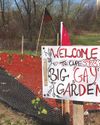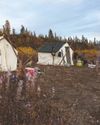
In June of 2018, the federal Liberals announced that “the cows are coming home”: closed nine years earlier by the Harper government, the prison farms at Joyceville and Collins Bay institutions in southern Ontario, just outside of Kingston, would be opening again.
For many in Kingston, it seemed like a victory. Since February of 2009, when the Tories first announced the sudden closure of all six federal prison farms in the country, a coalition of local farmers, residents, and community advocates called Save Our Prison Farms (SOPF) had been holding public meetings, organizing, and even getting arrested trying to keep the farms from closing, and then fighting to have them reopened.
Organic farmer Dianne Dowling, member of the National Farmers Union (NFU) and former president of the Kingston local, was one of those spearheading the effort. “The prison farms represent about 1,500 acres of some of the best farmland in the area,” says Dowling. “Our [union] local had been working to build the local food and farm system in the area for several years, through events and projects, and we did not want such good farmland going out of farming.” The campaign grew and began attracting national attention, and when cows from the original herd were being auctioned off in 2010, more than 100 groups and individuals contributed money to form the Pen Farm Herd Co-op, which was able to purchase some of the cows and keep the bloodline going in the hopes of one day restoring the herd from its original stock.
Esta historia es de la edición November/December 2019 de Briarpatch.
Comience su prueba gratuita de Magzter GOLD de 7 días para acceder a miles de historias premium seleccionadas y a más de 9,000 revistas y periódicos.
Ya eres suscriptor ? Conectar
Esta historia es de la edición November/December 2019 de Briarpatch.
Comience su prueba gratuita de Magzter GOLD de 7 días para acceder a miles de historias premium seleccionadas y a más de 9,000 revistas y periódicos.
Ya eres suscriptor? Conectar

PLATFORMS FOR PEOPLE, NOT PROFIT
Digital platforms boast that they’ve “democratized” cultural production. But what would truly democratic platforms look like in Canada?

ORGANIZING THROUGH LOSS IN THE HEART OF OIL COUNTRY
The story of climate justice organizing in Alberta, at the heart of the tarsands, is the story of a group of young activists learning what it means to lose, and keep on fighting

GROWING THE LABOUR MOVEMENT
How unions are using community gardens to engage members, nourish communities, and help strikers weather the picket line

A NEW ERA FOR OLD CROW
In the Yukon’s northernmost community, the Vuntut Gwitchin First Nation is reckoning with how to preserve their land and culture, amid a warming climate and an influx of tourists

“At Least Hookers Get Wages”
The risky business of sex work in the gig economy

The Literal – And Literary – Futures We Build
Briarpatch editor Saima Desai talks to two judges of our Writing in the Margins contest about Idle No More and MMIWG, ethical kinship, writing queer sex, and their forthcoming work.

The Cost Of A T-Shirt
In Honduras, women maquila workers are fighting back against the multinational garment companies that they say are endangering their health and safety.

Milking Prison Labour
Canada’s prison farms are being reopened. But when prisoners will be paid pennies a day, and the fruits of their labour will likely be exported for profit, there’s little to celebrate.

Bringing Back The Beat
In mainstream media, labour journalism has been replaced by financial reporting and business sections. But journalism students are raising the labour beat from the grave.

There's No Journalism On A Dead Planet
Corporate media owners are killing local newspapers – which is making it impossible for everyday people to understand the on-the-ground impacts of the climate crisis